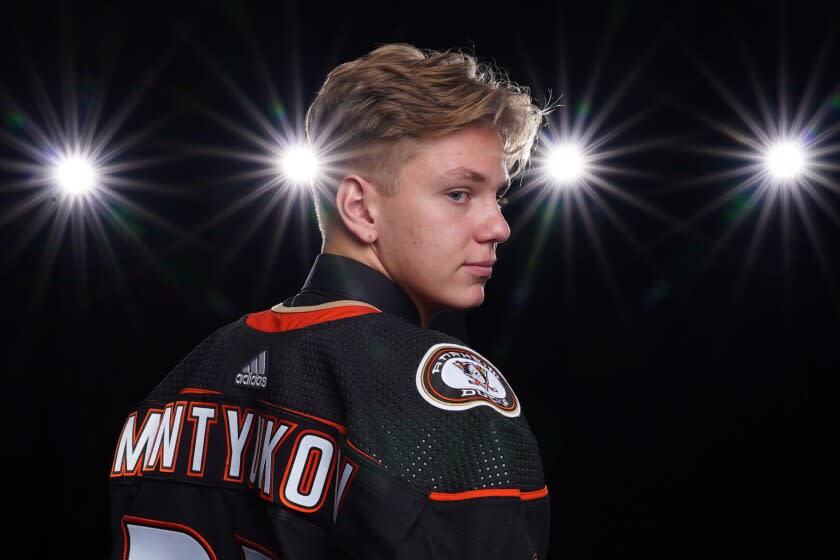Sports governing bodies and leagues have varied dramatically in their responses to Russia’s brutal invasion of Ukraine, ranging from outright banning athletes from Russia and Belarus from competitions in figure skating and track and field and on the hallowed grass of Wimbledon, to taking a business-as-usual approach in the NHL.
The league’s biggest sanction so far has been to decree the Stanley Cup won’t visit Russia this summer when the trophy makes the rounds among the winners, which will affect only Valeri Nichushkin of the Colorado Avalanche. But it’s clear that tension has escalated between the NHL and Russia, and it was reported last week that Philadelphia Flyers goaltending prospect Ivan Fedotov had been taken to a remote military base in northern Russia last week because he allegedly planned to leave for North America using fraudulent military identification. There are never any guarantees in the NHL draft — some kids peak at 18 and others take years to mature — but choosing Russian players this year seemed especially risky.
But the Ducks, drafting 10th after their fourth straight non-playoff season, chose Russian-born defenseman Pavel Mintyukov, 18, with the belief that they will be able to avoid potential travel problems because he has spent the past two seasons in North America and he doesn’t intend to return to Russia. If they’re right, they might have found a gem to strengthen a big, young defense corps.
A left-handed shooter, he’s 6 foot 2 and about 190 pounds. Playing for a bad team last season with Saginaw, Mich., of the Ontario (Canada) Junior League, he had 17 goals and 62 points in 67 games, third among the league’s defensemen. He previously played for Dynamo Moscow’s youth teams and was considered a fine goal scorer who can read plays well and knows when to jump in to support the offense. “He’s been on the radar all season,” Ducks general manager Pat Verbeek said. “What I love about the player, he’s very creative offensively from the defensive position. He’s got really good compete. Good hockey sense.”
With the 22nd pick, acquired when they traded Hampus Lindholm to the Boston Bruins, the Ducks chose center Nathan Gaucher of the Quebec Major Junior Hockey League. He had 31 goals and 57 points in 66 games with the Quebec Ramparts last season as well as three goals and nine points in 12 playoff games.
The Washington Capitals also chose a Russian player at No. 20, taking Ivan Miroshnichenko. He’s recovering from Hodgkin’s lymphoma but was in the audience at the draft in Montreal. At 24, Minnesota chose right wing Danila Yurov from Magnitogorsk, a Russian junior team.
The Montreal Canadiens began things with a surprise, taking Slovakian forward Juraj Slafkovsky with the first overall pick.
Slafkovsky was 17 when he was voted the most valuable player of the Beijing Olympic hockey tournament for leading his team to a bronze medal, but Canada-born Shane Wright had been considered the safe choice to go first overall. Wright fell to Seattle at No. 4 after New Jersey chose Slovakian defenseman Simon Nemec and Arizona chose Pittsburgh-born center Logan Cooley from the U.S. National Team Development program. It was the first time players from Slovakia had been chosen 1-2.
“I still cannot believe this actually happened,” Slafkovsky said in an interview on ESPN. Canadiens general manager Kent Hughes said Slafkovsky has “a confidence to him. His character and personality are engaging and he draws people to him.
The second through seventh rounds will be held on Friday.
The Kings didn’t have a first-round pick because they traded the 19th selection to Minnesota to acquire the rights to Kevin Fiala, whom they later signed to a seven-year contract. They own the 51st, 86th, 116th, 148th and 180th picks. But the Kings weren’t idle Thursday: they announced they’d hired former goaltender Manon Rheaume as a hockey operation/prospect advisor with a focus on player development. Rheaume in 1992 became the first woman to play in an NHL game when she played goal for Tampa Bay in an exhibition game. She also won an Olympic silver medal with Canada at the 1998 Winter Olympics.
Before the draft began, the Chicago Blackhawks traded forward Alex DeBrincat to Ottawa for the seventh and 39th picks in this year’s draft and a third-round pick in 2024. That’s a big haul for the rebuilding Blackhawks and a risk for Ottawa because DeBrincat is under contract for only one more season before he becomes eligible for restricted free agency. During the draft the Blackhawks traded Kirby Dach, who was the third pick in 2019, to Montreal for first- and third-round picks this year.
Earlier in the day, the recently crowned Stanley Cup champion Colorado Avalanche, anticipating salary cap problems, acquired Alexandar Georgiev from the New York Rangers and are expected to let Darcy Kuemper leave. Colorado general manager Joe Sakic, honored on Thursday as the league’s top GM, gave up third- and fifth-round picks this year and a third-round pick next year.
The relationship between the NHL and its Russian players seems fragile, and some Russians who might have been drafted earlier undoubtedly fell a few spots because of uncertainty over whether they will be allowed to play in North America. Sports and politics often make for uneasy partners.
This story originally appeared in Los Angeles Times.



